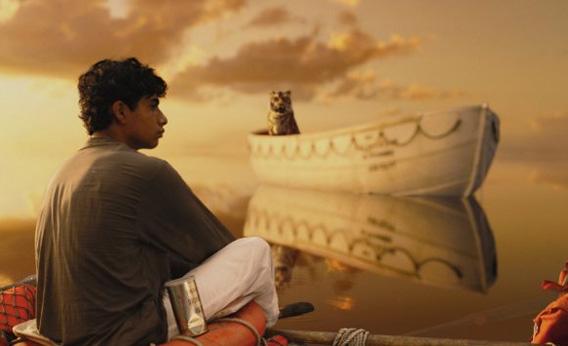
The beautiful book and its movie adaption, Life of Pi, may benefit some religious fundamentalists, but a closer look at its message reveals a pseudo-philosophy that doesn't hold water.
Religion relies on a person's willingness to disregard truth and logic for a payoff (faith). Talk with any believer and almost every one will admit this without shame. Pi's religion (a hybrid with the overarching belief that any type of faith is better than no faith) skips all the rules and orthodoxy to reach today's audience, but is still faith-based.
When it comes to the uncertainties of life or which story is actually true, Martel says that since we can't know the truth, it's better to pick the magical story (in his metaphor, the tiger story). He's justifying religions the world over. Unfortunately, to make his perspective appear both new and respectable, he has to misrepresent other perspectives, mainly atheism and agnosticism:
Atheists are my brothers and sisters of a different faith, and every word they speak, speaks of faith. Like me, they go as far as the legs of reason will carry them – and then they leap (35).
I can well imagine an atheist’s last words: ‘White, white! L-L-Love! My God!’ – and the deathbed leap of faith. Whereas the agnostic, if he stays true to his reasonable self, if he stays
beholden to dry, yeastless factuality, might try to explain the warm light bathing him by saying, ‘Possibly a f-f-failing oxygenation of the b-b-brain,’ and to the very end, lack imagination and miss the better story (81).
Most Atheists believe that the notion of god is so ridiculous that it isn't worth believing. They see, as in Russell's Teapot Analogy, religion and the notion of god as being so remote that they prefer to focus on what we do know; most frequently on science. The atheist then, would be proclaiming the failing oxygenation of the brain while the agnostic would be saying that he/she isn't sure what the white light is. Martel intentionally misrepresents atheists so he can call them his own.
Believing that there is no god is a form of faith, but simplifying things to this level is insulting to most Atheists whose perspective of life, nature, and beauty is so much more complicated than "believing there is no god". One could say that an Atheist's faith in science is similar to religious faith, but if you're going to be that extreme in questioning reality, you may as well be an agnostic and drop out of the debate entirely.
Here is another quote from the book:
It is not atheists who get stuck in my craw, but agnostics. Doubt is useful for a while. We must all pass through the garden of Gethsemane. If Christ played with doubt, so must we. If Christ spent an anguished night in prayer, if He burst out from the Cross, ‘My God, my God, why have you forsaken me?’ then surely we are also permitted doubt. But we must move on. To choose doubt as a philosophy of life is akin to choosing immobility as a means of transportation (36).
I've seen the last sentence posted around the internet like it means something. I might be able to respect the quote if he adds "when you're already moving" at the end, to signify that no one can doubt the fact that they are what they are. As the quote stands, he ignores that doubting requires all types of reasons for doing so. In other words, the agnostic can still lead a completely fulfilling life (transportation) by remaining open and experiencing the world around. In addition, the effort it takes to remain open and critical of the world while others are manipulated into their belief because of fear, loneliness, and ignorance is anything but immobility and can be more strengthening and rewarding as a life path than stories about tigers and zebras.
Both atheists and agnostics believe that the world is a beautiful and amazing place on its own, without the need to make and believe fantasies. This doesn't work well for someone who wants to sell you one. Both the book and movie were great as works of art, but leave the pseudo-philosophy for the clergy.